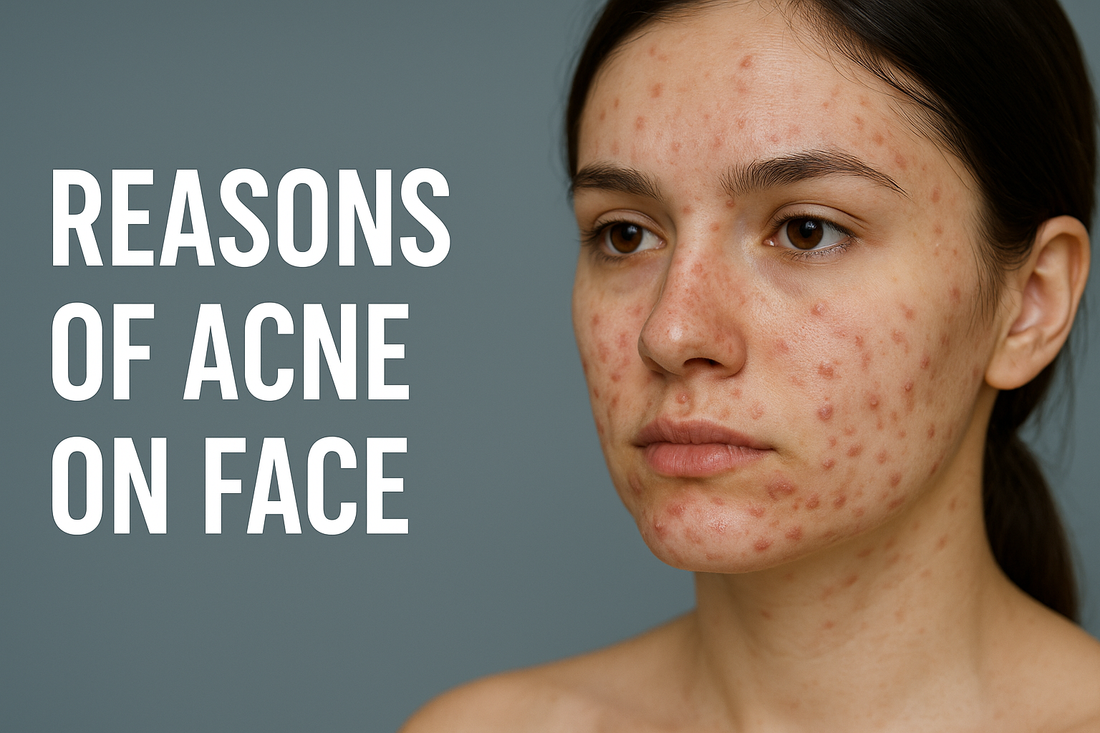
Reasons of Acne on Face: Understanding the Root Causes
Share
Acne is one of the most common skin conditions, affecting millions of people worldwide. While often associated with teenagers, it can occur at any age. Acne on the face can be frustrating, especially since it directly impacts appearance and confidence. To manage it effectively, it’s important to understand why it happens.
In this blog, we’ll explore the main reasons behind facial acne, including biological, lifestyle, and environmental factors.
1. Excess Oil Production (Sebum Overload)
Your skin naturally produces oil (sebum) to keep it hydrated. However, when the sebaceous glands produce too much oil, pores can become clogged. This excess sebum mixes with dead skin cells and dirt, creating the perfect environment for acne-causing bacteria to thrive.
2. Clogged Pores and Dead Skin Cells
When dead skin cells are not shed properly, they build up on the skin’s surface and block pores. Once blocked, these pores can turn into blackheads, whiteheads, or pimples. People with oily skin are more prone to this problem.
3. Bacterial Growth (P. acnes)
A type of bacteria called Propionibacterium acnes (P. acnes) lives on the skin. Normally, it’s harmless, but when pores are clogged, this bacteria multiplies rapidly and causes inflammation. This leads to red, swollen, and sometimes painful pimples.
4. Hormonal Imbalances
Hormones play a huge role in acne formation. During puberty, pregnancy, menstrual cycles, or conditions like PCOS, hormone fluctuations increase oil production. This is why many people notice breakouts at specific times in their monthly cycle.
5. Diet and Nutrition
What you eat can affect your skin. Diets high in sugar, processed foods, dairy, and unhealthy fats are linked with more frequent breakouts. On the other hand, a balanced diet with vegetables, whole grains, and plenty of water can support clear skin.
6. Stress and Lack of Sleep
Stress triggers the release of cortisol, a hormone that increases oil production and inflammation in the body. Similarly, lack of sleep disrupts hormonal balance and slows down skin healing, making acne worse.
7. Use of Heavy or Irritating Skincare Products
Not all skincare is good for acne-prone skin. Products that are too oily, comedogenic (pore-clogging), or contain harsh chemicals can irritate the skin. This irritation worsens acne rather than healing it.
8. Environmental Factors
Pollution, dust, and humidity can settle on your skin, clog pores, and trigger breakouts. Even frequent touching of the face with dirty hands transfers bacteria and dirt, leading to acne flare-ups.
9. Genetics and Family History
If your parents struggled with acne, chances are you might too. Genetics can influence skin type, oil production, and how your body responds to hormonal changes and bacteria.
10. Medical Conditions and Medications
Certain health issues (like thyroid problems or hormonal disorders) and medications (such as steroids, lithium, or some birth control pills) can contribute to acne. If you suspect this, consulting a dermatologist is crucial.
Final Thoughts
Acne on the face is rarely caused by a single factor—it’s usually a combination of hormones, lifestyle habits, skincare routines, and genetics. The good news is that with the right knowledge and treatment plan, it can be managed effectively.